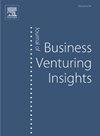探讨性骚扰在企业环境中的影响:行动呼吁和研究路线图
Q1 Business, Management and Accounting
引用次数: 0
摘要
在创业环境中,性骚扰仍然是一个常见但尚未得到充分研究的问题。尽管先前的研究已经阐明了骚扰在传统组织中的影响,但在非正式的、高压的创业领域中,骚扰的明显影响在很大程度上仍被忽视。我们通过调查预期的和经历的性骚扰如何影响妇女在创业中的参与、行动和成功来解决这一差距。根据组织行为学和性骚扰文献的见解,我们不仅研究了骚扰对女性企业家个人的影响,还研究了骚扰对利益相关者和更广泛的生态系统的影响。预期的骚扰可能会阻碍女性进入高增长行业或参与重要的网络和筹款活动,而经历过的骚扰可能会导致心理压力、知名度降低和提前离开企业。利益相关者——包括导师、投资者和家人——也可能会改变他们的参与方式,以应对感知到的风险,从而限制他们获得必要支持的机会。在生态系统层面,骚扰可能会强化排他性规范,并造成阻碍性别平等和创新的结构性障碍。通过这一多层次视角,我们为更好地理解性骚扰对女性创业的复合效应提供了一个框架,并为未来的研究提出了新的方向。本文章由计算机程序翻译,如有差异,请以英文原文为准。
Exploring the impact of sexual harassment in entrepreneurial contexts: A call to action and research roadmap
Sexual harassment continues to be a common yet understudied problem that occurs in entrepreneurial environments. Although prior studies have clarified its impacts in conventional organizations, the distinct effects of harassment in the informal, high-pressure realm of entrepreneurship remain largely overlooked. We address this gap by investigating how both anticipated and experienced sexual harassment may influence women's participation, actions, and success in entrepreneurship. Adapting insights from the organizational behavior and sexual harassment literatures, we examine the effects of harassment not only on individual women entrepreneurs but also on stakeholders and broader ecosystems. Anticipated harassment may discourage women from entering high-growth sectors or participating in vital networking and fundraising efforts, while experienced harassment experiences can result in psychological stress, diminished visibility, and early departure from ventures. Stakeholders—including mentors, investors, and family—may also shift their engagement in response to perceived risks, limiting access to essential support. At the ecosystem level, harassment likely reinforces exclusionary norms and creates structural barriers that impede gender equity and innovation. Through this multilevel perspective, we provide a framework for better understanding the compounding effects of harassment on women in entrepreneurship and propose new directions for future research.
求助全文
通过发布文献求助,成功后即可免费获取论文全文。
去求助
来源期刊

Journal of Business Venturing Insights
Business, Management and Accounting-Business and International Management
CiteScore
11.70
自引率
0.00%
发文量
62
审稿时长
28 days
 求助内容:
求助内容: 应助结果提醒方式:
应助结果提醒方式:


